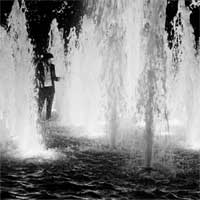
Destroyer
Archer on the Beach
(Merge; 2010)
By Alan Baban | 8 November 2010
Dan Bejar has gone on record to say he was only minimally involved in the musical aspect of Archer on the Beach: other than the somnambulant chord progression of the title track and the odd sound effect, all credit goes to Kranky ambient dudes Tim Hecker (the title track) and Loscil (the—we’ll get to how wristslit fever-ish “Grief Point” is in a sec.) This isn’t other artists branding themselves on something pre-established; it’s nothing like when Frog Eyes were called upon to decontrol Your Blues (2004) standouts on the Notorious Lightning & Other Works EP (2005). This is Destroyer scrawling over some ambient shit.
And it’s awesome! Over its eighteen minutes you hear Bejar absolutely jettisoning his habit to lord it over, queen it, strike a pose of the social climber or the bearded bum; he doesn’t play anyone except himself and, despite this being a collaborative project, Archer is the most “himself” we’ve ever got from Dan. Your ability to enjoy it really counts on how invested you are in the Bejar back catalogue—this EP is the bombed-out capstone for those great, great records.
Of the two tracks, the Hecker collaboration is the less interesting, the more wilfully abstract. Over delayed keys and a sampled crowd noise that lingers like a wishful thought of assurance, Bejar coos to us, “Careful now / Watch your step / In you go.” He isn’t ribbing and, by the end of the track’s nine minutes, you might already be wearied out. But just you wait…
“Grief Point,” building on this year’s “The Making of Grief Point,” is Bejar’s dead-letter admission of the inscrutable. Loscil’s instrumental track sounds like a cold, grey dawn; any inkling of sun is put to sleep by the erstwhile Destroyer drummer’s woebegone ambient smokestacks. It’s a highly sobering listen and, to my mind, the most disconsolate nine minutes of Bejar’s career—a gutted heaviness he seems to allude to when he says, “I think the world does not like me grim.” And continues: “It likes me melancholic, but not miserable…” And continues: “English on the Mediterranean, which is, oddly enough, some of the worst people there is.” The song ends with a door snapping shut, footsteps spiriting away, and a fade-out convulsed with sadness and loss. Right before Loscil disinvites himself from the psycho-morbid party, Bejar flatly and passively intones, “It is done.” He doesn’t need to repeat it; there are no baa-baa-baas, no tonic melody, nothing but creeping tedium and weariness and oppression. Remember, this is a collaborative EP, this is the frickin’ follow-up to the sprawling piss-disco of last year’s incredibly promising (well, in the Destroyer-verse) Bay of Pigs EP, and this is the last we’ll hear of Bejar before new record Kaputt finally drops next year.
Which: a new record in two months! Which is going to be great! So why does Destroyer sound so totally enamoured with the concept of killing himself off? Why was Dan so clinically depressed when he recorded this whatever-it-is?
The press-release calls “Grief Point” the “first recording Bejar made after deciding never to record again.” You literally hear him flipping his notebook on this track. There are odd details: ambulance sirens, creaking floorboards; at one point he stumbles on his lines, drops some ice in the glass and fills it (I guess) with Jameson as a dog barks, muffled, in the background. Then he says, “I have lost interest in music…it is horrible.” Later he mentions the muted response to 2008’s Trouble in Dreams, and like a cyanide-armed cyberchondriac quickly losing the plot, or refreshing Wikipedia, moves from disappointment into non-sequitur: “The message from the critical reception of Dreams was quite clear: ‘We will not listen to you any further.’ Of course, some tension is created—cosmonaut in a bread-line, et cetera.” If Bejar has made a habit out of being an artifice-moulder, an unshakable contrarian—and if Dreams really was the first time that he’d soft-soaped his way through a studio record; it was basically Rubies (2006) Mk. Baa-Baa—this is him humanised. This is the most direct and derelict he’s ever been.
The key line across the entire EP may be when Dan admits, “I’ve often come back depressed by what we have done, what we are doing,” and then adds coyly, “It’s good. It means I’ve changed.” Which is another way of saying: Destroyer is fucking back, and one can only predict now that next year’s Kaputt is a return to the trail-blazing form that saw Bejar counterpointing Bejar with every new release. Who knows where he goes now, but between this and Bay of Pigs, the indication is dude won’t just drunkenly actualize in the form of yet another wordless chorus. I think it’s going to be very special. Count me psyched.





